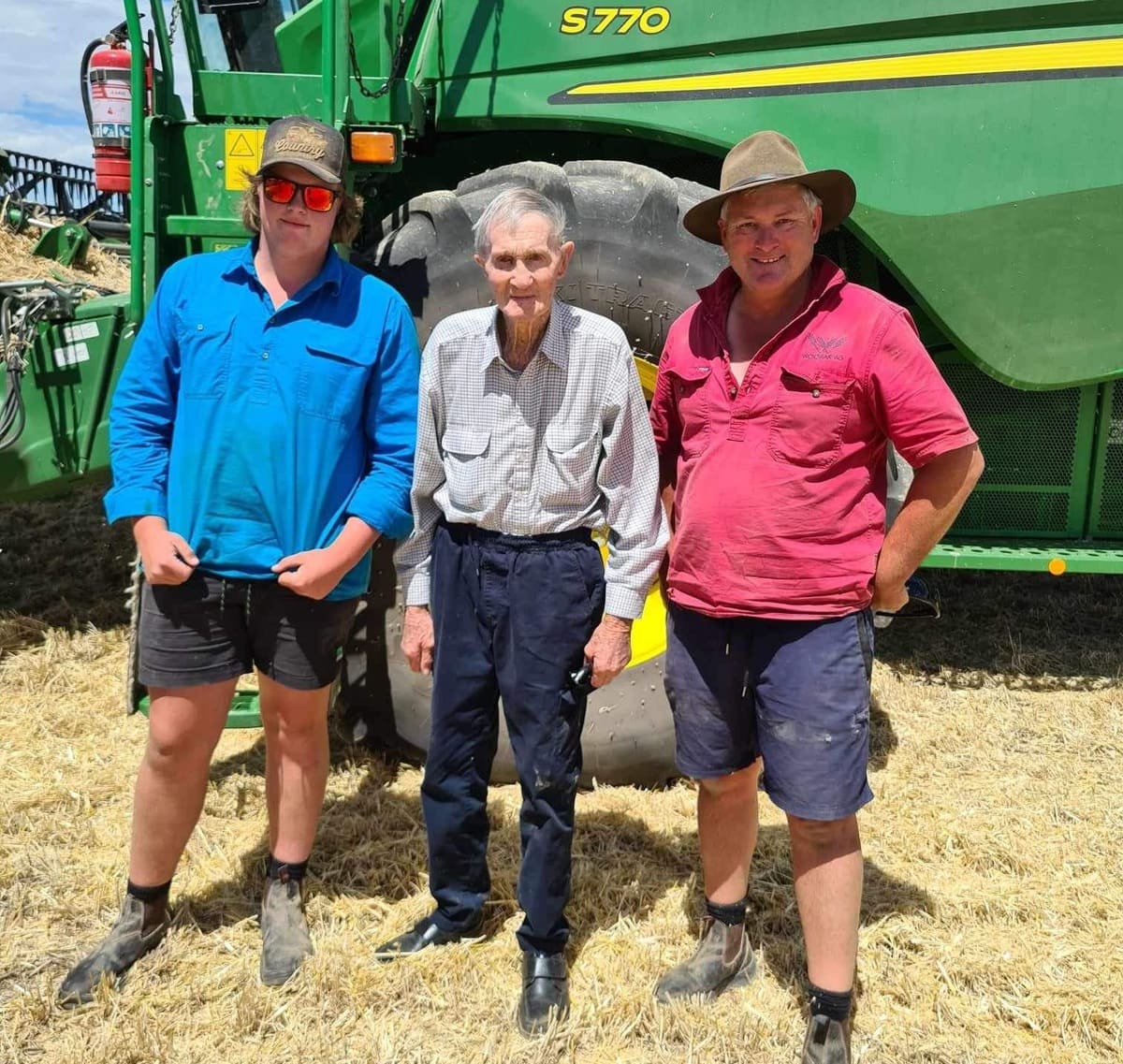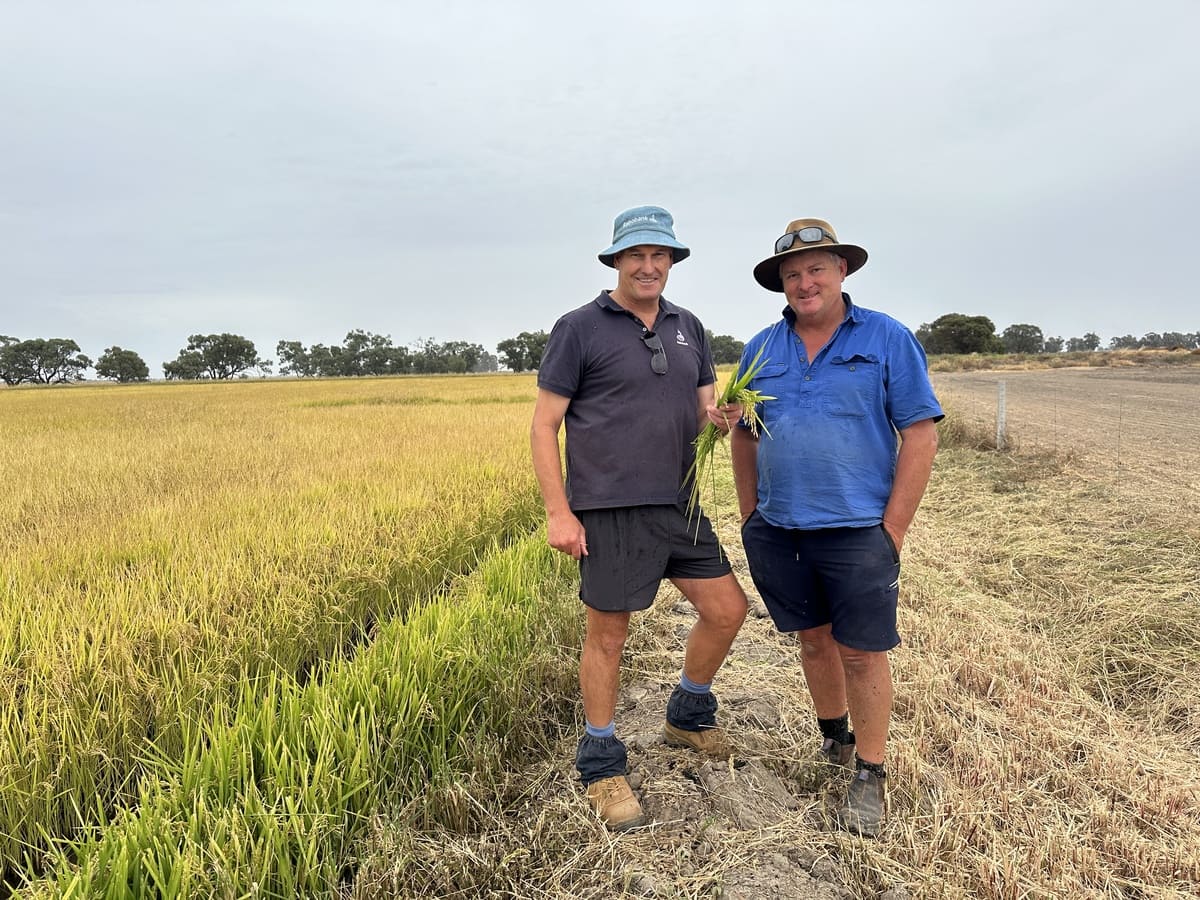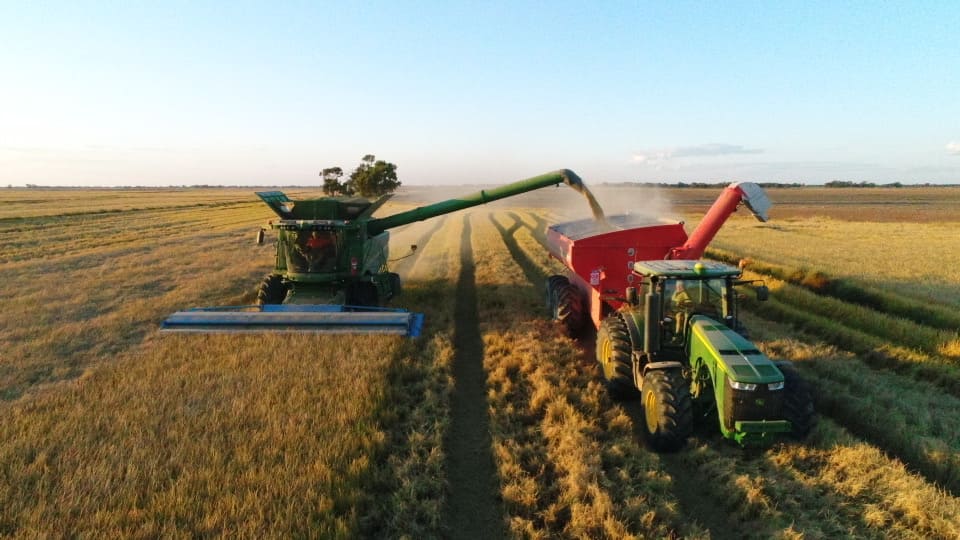Posted by on
17/07/2024
Neville and Brooke Hollins.
Credit: Photographer Vince Bucello, supplied by Rice Extension
From breaking ground, to groundbreaking, for three generations the Hollins family has been growing rice with an energy and vision that continues to lead the industry to this day.
While Neville and Brooke Hollins have grown the family’s Burraboi operation, Woorak Ag, to include irrigated winter cereals and sheep, rice growing remains an important enterprise – and one etched in their history
“Nev’s grandfather was one of the industry’s pioneers and he documented everything, it's amazing history and a contribution we’re all very proud of,” Brooke says with a smile.
With their property the site of one of the Riverina’s very first rice trials, records include results from the 1942 experimental plot, which suggest 3.8 acres were sown, using 17.95 feet of water to the acre and yielding 1.91 tonne/acre.
Nev’s father Neil Hollins was also a leading producer in the district, and at 91 years old he questions those who refer to the past as ‘the good old days’.
“He believes there wasn’t too much good back then, just hard manual work compared to today’s way of farming.”
“When you hear his stories, you realise how hard they did it,” Neville explains. “In his day harvesting 20 to 30 tonne a day was massive, now we’re doing that in half an hour.”
Despite the modern industry progression, the family’s growing history remains valued arsenal, and has presented some unexpected modern solutions.
“One year it was so wet we just didn’t know how we were going to get our soil prepared and our rice in, and after some advice from dad, who had overcome the same issue decades before, we bought a potato cultivator and we were able to remove the organic matter and incorporate our fertiliser, and we got all our rice in on time.”
“That’s the sort of knowledge you just can’t buy, and it’s down to pure experience – we can learn from the mistakes, and successes, of the old-timers.”
Whilst respecting the past, a focus on modern efficiencies earned Neville and Brooke the esteemed “SunRice Rice Grower of the Year” award in 2022, with soil health and growing the most they can from a limited resource a key focus for their business.

Three generations, Jack, Neil and Neville Hollins.
The installation of pivots has significantly improved water use efficiency, and they’ve strategically developed their enterprise so that dryland winter cereal crops are on lighter soil.
“On our irrigated area the pivots help mitigate any year-to-year water allocation discrepancies – we’re able to fully leverage a normal water allocation with good rice production, and if the allocation is down the pivot gives us an opportunity for extra wheat and barley tonnage when cereal prices are up.”
Re-lasering paddocks has been a recent focus, and the Hollins’ follow a program of leveling 100 hectares a year – helping maintain water levels to the correct height, helping the efficiency of the pre-emergent chemical usage, and improving yields.
Neville jokes that his new air-conditioned Can-Am has been another pivotal development, yet considering his appreciation for crop husbandry – and 12,000kms on the clock checking crops each year – it’s proving an important investment.
“We are constantly checking our rice, physically managing and watching it – you can’t replace a good set of eyes when growing a crop and we check morning and night, which is made a lot more comfortable thanks to the new Can-Am!”
While automation is re-defined labour savings across several other industries, Neville believes it has valuable potential for rice growers.
“We may only grow rice in a paddock once every four years, so it’s a big investment, and while it’s encouraging to see research into automation for rice layouts, it still has a long way to go.”
The Hollins are currently taking part in an automation trial program, whereby Wi-Fi has been installed across parts of the farm to support the remotely controlled gates and water monitors in their bays for efficient irrigation.
“This innovation would certainly provide peace of mind, particularly if a gate was still open, or if there was a bank blowout – you’d get an alert immediately, whereas traditionally you wouldn’t realise there was a problem until the physical drive around.”
Rabobank’s hand-in-hand support
As a bank dedicated to agriculture, Neville and Brooke acknowledge the unique support they enjoy.
“The fact Rabobank understands agriculture is a huge benefit to our business, and we value the relationship we have with our manager Tim Triplett and his expertise.”
The couple also appreciate Rabobank’s commitment to the region, particularly giving back to the community, and encouraging social interaction.

Rabobank’s Tim Triplett and Neville Hollins.
“We had the RaboTruck on our farm back in March for a knowledge-sharing and networking event, and it was excellent – not too formal, and with valuable information shared.”
“Rabobank sees the value in farmers mingling with farmers, and provides great opportunities to get out, learn and enjoy conversations about life – not just about overdrafts!”
The couple also recently attended a Rabobank Carbon Training Workshop, an initiative aimed at giving farmers a basic understanding of the opportunities, and challenges, of carbon in farming.
“It was very interesting, and great to know that Rabobank is on the front foot keeping farmers abreast of what’s potentially coming, although I think there’s still a long way to go for rice and cropping in terms of carbon opportunities.”
“Regardless of carbon opportunities, our soil health remains a number one priority, we want our land to still be here, and enjoying peak production, for our kids, and theirs,” Brooke says.
With their two children, 18-year-old Jack and 15-year-old Matilda both showing a strong passion for farming, Brooke believes it’s a privilege to be able to provide them with the opportunity.
“We’re only caretakers of this land, and our job is to nurture it, build it and pass it on in full health – we’re proud of the developments and improvements Neil made to enable us to be here, and we feel fortunate to give our children the same opportunity.”

